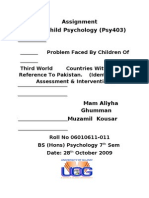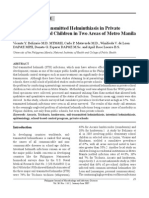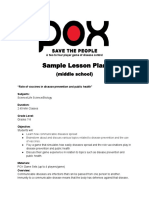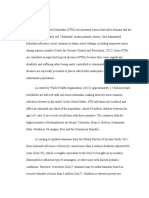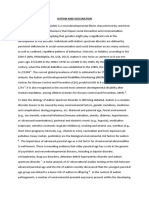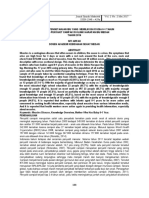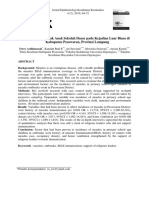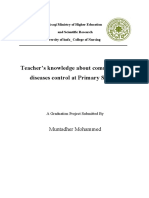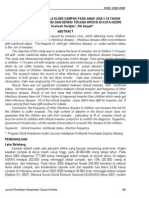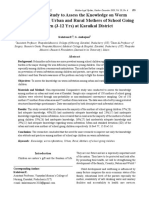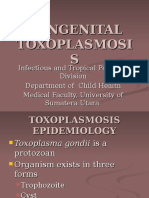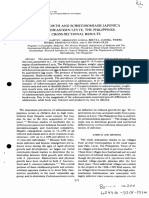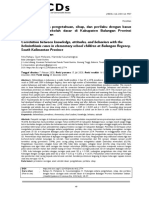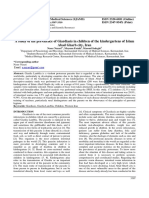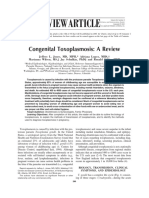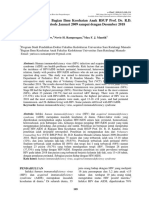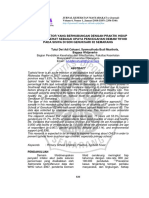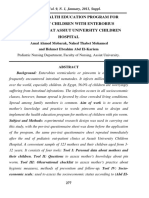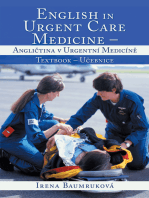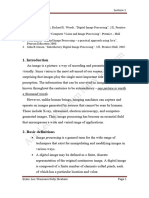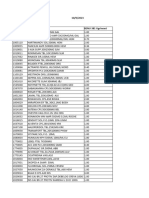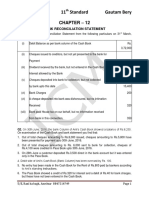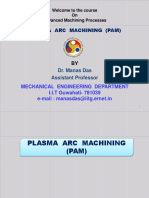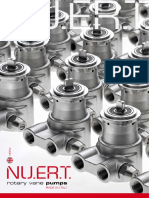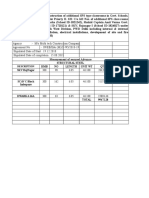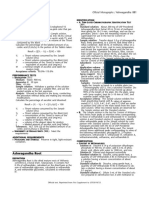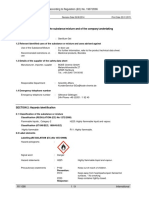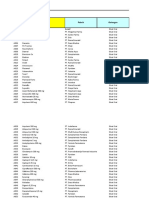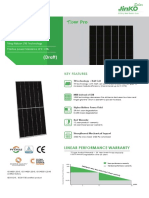Professional Documents
Culture Documents
Soil Transmitted Helminthiasis
Uploaded by
Superboinky0 ratings0% found this document useful (0 votes)
72 views9 pagesThis document summarizes information about Soil Transmitted Helminthiasis (STH), which refers to parasitic infections caused by nematodes transmitted through soil contaminated with feces. The main species that cause STH are roundworms, whipworms, and hookworms. STH infections most commonly affect pre-school and school-aged children and can cause poor physical growth, intellectual development, and cognitive impairment, as well as anemia and malnutrition. The document also provides facts about the Philippines' Integrated Helminth Control Program (IHCP), which conducts deworming activities in schools twice per year.
Original Description:
SOIL TRANSMITTED HELMINTHIASIS
Original Title
SOIL TRANSMITTED HELMINTHIASIS
Copyright
© © All Rights Reserved
Available Formats
PPTX, PDF, TXT or read online from Scribd
Share this document
Did you find this document useful?
Is this content inappropriate?
Report this DocumentThis document summarizes information about Soil Transmitted Helminthiasis (STH), which refers to parasitic infections caused by nematodes transmitted through soil contaminated with feces. The main species that cause STH are roundworms, whipworms, and hookworms. STH infections most commonly affect pre-school and school-aged children and can cause poor physical growth, intellectual development, and cognitive impairment, as well as anemia and malnutrition. The document also provides facts about the Philippines' Integrated Helminth Control Program (IHCP), which conducts deworming activities in schools twice per year.
Copyright:
© All Rights Reserved
Available Formats
Download as PPTX, PDF, TXT or read online from Scribd
0 ratings0% found this document useful (0 votes)
72 views9 pagesSoil Transmitted Helminthiasis
Uploaded by
SuperboinkyThis document summarizes information about Soil Transmitted Helminthiasis (STH), which refers to parasitic infections caused by nematodes transmitted through soil contaminated with feces. The main species that cause STH are roundworms, whipworms, and hookworms. STH infections most commonly affect pre-school and school-aged children and can cause poor physical growth, intellectual development, and cognitive impairment, as well as anemia and malnutrition. The document also provides facts about the Philippines' Integrated Helminth Control Program (IHCP), which conducts deworming activities in schools twice per year.
Copyright:
© All Rights Reserved
Available Formats
Download as PPTX, PDF, TXT or read online from Scribd
You are on page 1of 9
Soil Transmitted Helminthiasis (STH)
Engr. JOSE M. ZIPAGAN, PSE, MPA
IHCP Program Manager
January 10,2017
Soil Transmitted Helminthiasis
Refer to a group of parasitic infections
caused by nematodes or a sub-group of
helminth species. It is caused specifically
by helminths transmitted through soil
contaminated with fecal matter.
Also known as worm infections, most
common among school-aged children
Main Species of STH
1. Roundworms – (Ascaris lumbricoides)
2. Whipworms – (Trichuris trichuria)
3. Hookworms – (Necator americanus &
Ancylostoma duodenale)
1-4 years old (Pre-school) – suffer the greatest
morbidity
5-18 years old (School-aged) – harbor the greatest
load of infection
1-12 years old – highest intensity of infection
6-14 y/o – 65% Prevalence rate
1-5 y/o – 66% Prevalence rate
Effects of STH Infections
1. Cause poor physical growth
2. Poor intellectual
development
3. Impaired cognitive functions
4. Can result to anemia &
malnutrition
Facts about IHCP
All schools perform deworming activities
twice a year (July and January)
Through Garantisadong Pambata (GP),
deworming is done April and October
School deworming started 2006 yet
Drugs are provided by DOH
DOH investment is about Php35M/year
on drugs alone
Facts about STH
2004 PSC prevalence is 66 %
(LuzViMinda)
2005 SC prevalence is 67% (LuzViMinda)
1 out of 2 students is positive
Deworming coverage range from 48-70%
(2007-2012)
If 30% of 12M SC is not dewormed, it is
1.8M SC presumed infected
Parasitism causes cognitive impairment
So what can we do to help those
children?
“’We find ways…”
Anong plano mo?
Usap tayo.
Good day!
Mwah.tc.**
You might also like
- Risk Factors Associated With Malnutrition in One-Year-Old Children Living in The Peruvian AmazonDocument11 pagesRisk Factors Associated With Malnutrition in One-Year-Old Children Living in The Peruvian AmazonJordy Mendoza FernandezNo ratings yet
- Poverty, Dietary Intake, Intestinal Parasites, and Nutritional Status Among School-Age Children in The Rural PhilippinesDocument10 pagesPoverty, Dietary Intake, Intestinal Parasites, and Nutritional Status Among School-Age Children in The Rural PhilippinesKarina YesikaNo ratings yet
- Manuskrip Fitriamayangsari (1114160492)Document9 pagesManuskrip Fitriamayangsari (1114160492)Maya BtlNo ratings yet
- Assignment Child Psychology (Psy403)Document18 pagesAssignment Child Psychology (Psy403)MuzamilNo ratings yet
- 9bb76c11-75fb-47f4-8f3d-2022 DFREWWWERTDocument30 pages9bb76c11-75fb-47f4-8f3d-2022 DFREWWWERTCharles VieiraNo ratings yet
- BelizarioDocument8 pagesBelizarioBryan Christopher Co LaoNo ratings yet
- Abstrak Titis FixDocument1 pageAbstrak Titis Fixauliya nidaNo ratings yet
- PediatricsDocument495 pagesPediatricsabdo fadilNo ratings yet
- Gambaran Pengetahuan Penyakit Cacingan (Helminthiasis) Pada Wali Murid SDN 1, 2, 3, Dan 4 Mulyoagung, Kecamatan Dau, Kabupaten Malang, Jawa TimurDocument10 pagesGambaran Pengetahuan Penyakit Cacingan (Helminthiasis) Pada Wali Murid SDN 1, 2, 3, Dan 4 Mulyoagung, Kecamatan Dau, Kabupaten Malang, Jawa TimurEdhy SantigiNo ratings yet
- Epidemiology and Determinants of Soil-Transmitted Helminthiases Among Selected Primary School Children in Tuguegarao City, Cagayan, Philippines: A Cross-Sectional StudyDocument4 pagesEpidemiology and Determinants of Soil-Transmitted Helminthiases Among Selected Primary School Children in Tuguegarao City, Cagayan, Philippines: A Cross-Sectional StudyIJEAB JournalNo ratings yet
- 13-Risk Factors of Tuberculosis in ChildrenDocument5 pages13-Risk Factors of Tuberculosis in ChildrenAnthony Huaman MedinaNo ratings yet
- Sample Lesson Plan: (Middle School)Document10 pagesSample Lesson Plan: (Middle School)n vinay kumar reddyNo ratings yet
- Community Medicine Last Moment RevisionsDocument17 pagesCommunity Medicine Last Moment RevisionsDeepak Maini100% (2)
- Tambahan TransleteDocument9 pagesTambahan TransleteRamadhana PutraNo ratings yet
- Chapter OneDocument20 pagesChapter OneErik Maximus SarmientoNo ratings yet
- Stunting and Soil-Transmitted-Helminth Infections Among School-Age Pupils in Rural Areas of Southern ChinaDocument6 pagesStunting and Soil-Transmitted-Helminth Infections Among School-Age Pupils in Rural Areas of Southern ChinaRohit GehiNo ratings yet
- Main ReportDocument131 pagesMain Reportmanish_agr87No ratings yet
- Autism and Vaccination (Final)Document8 pagesAutism and Vaccination (Final)Rajan JattNo ratings yet
- Prevalence & Risk Factors For Soil Transmitted Helminth Infection Among School Children in South IndiaDocument7 pagesPrevalence & Risk Factors For Soil Transmitted Helminth Infection Among School Children in South IndiaPinandhito LatukolanNo ratings yet
- Gambaran Pengetahuan Ibu Yang Memiliki Bayi Usia 0-1 Tahun Tentang Penyaki Campak Di Klinik Harapan Ibu Di MedanDocument8 pagesGambaran Pengetahuan Ibu Yang Memiliki Bayi Usia 0-1 Tahun Tentang Penyaki Campak Di Klinik Harapan Ibu Di MedanfatmaNo ratings yet
- AutismDocument28 pagesAutismNisha M SNo ratings yet
- SAM Under 5Document6 pagesSAM Under 5BerhanuNo ratings yet
- Faktor Risiko Campak Anak Sekolah Dasar Bb35a6b3Document9 pagesFaktor Risiko Campak Anak Sekolah Dasar Bb35a6b3Masyithah ZerlinaNo ratings yet
- Gambaran Pengetahuan Cacingan Wali Murid Di IndonesiaDocument10 pagesGambaran Pengetahuan Cacingan Wali Murid Di IndonesiaSalsa AlifaNo ratings yet
- IntroductionDocument9 pagesIntroductionمرتضى محمد منصورNo ratings yet
- Group 1 ResearchDocument11 pagesGroup 1 ResearchFelix RemillosaNo ratings yet
- Research Article Gastrointestinal Nematodes Among Residents in Melong, Moungo Division, Littoral Region, CameroonDocument8 pagesResearch Article Gastrointestinal Nematodes Among Residents in Melong, Moungo Division, Littoral Region, CameroonVonny AngrainiNo ratings yet
- Potensi Vaksin Untuk Daya Tahan Tubuh AnakDocument4 pagesPotensi Vaksin Untuk Daya Tahan Tubuh AnakSalsabilarc 12No ratings yet
- Tentang Penyakit CampakDocument8 pagesTentang Penyakit CampakFerry JuniansyahNo ratings yet
- Position Paper On Japanese Encephalitis Vaccines v2Document3 pagesPosition Paper On Japanese Encephalitis Vaccines v22140916No ratings yet
- Vol 19 Num 2 Topic 3Document3 pagesVol 19 Num 2 Topic 3Timothy GatchalianNo ratings yet
- MLU October-December - 2020 (20) - RemovedDocument5 pagesMLU October-December - 2020 (20) - Removedgao1989No ratings yet
- PARASITIC INFECTIONS Intestinal Parasitoses Epidemiology Part 1Document29 pagesPARASITIC INFECTIONS Intestinal Parasitoses Epidemiology Part 1Alexandra maeNo ratings yet
- ParasitismDocument12 pagesParasitismrenNo ratings yet
- Congenital ToxoplasmosisDocument26 pagesCongenital ToxoplasmosisMichael WijayaNo ratings yet
- Child Growth and Schistosomiasis Japonica in Northeastern Leyte, The Philippines: Cross-Sectional ResultsDocument9 pagesChild Growth and Schistosomiasis Japonica in Northeastern Leyte, The Philippines: Cross-Sectional Resultscarlos surigaoNo ratings yet
- 2774 6966 1 SMDocument11 pages2774 6966 1 SMFanky RamadhanNo ratings yet
- Hubungan Antara Pengetahuan, Sikap, Dan Perilaku Dengan Kasus Cacingan Anak Sekolah Dasar Di Kabupaten Balangan Provinsi Kalimantan SelatanDocument9 pagesHubungan Antara Pengetahuan, Sikap, Dan Perilaku Dengan Kasus Cacingan Anak Sekolah Dasar Di Kabupaten Balangan Provinsi Kalimantan SelatanGunawanNo ratings yet
- Acta Tropica: Somphou Sayasone, Jürg Utzinger, Kongsap Akkhavong, Peter OdermattDocument10 pagesActa Tropica: Somphou Sayasone, Jürg Utzinger, Kongsap Akkhavong, Peter Odermattetik ainun rohmahNo ratings yet
- Unvaccinated HealthDocument6 pagesUnvaccinated Healthjamie_clark_2No ratings yet
- Research Article A Study of The Prevalence of Giardiasis in Children of The Kindergartens of Islam Abad Gharb City, IranDocument4 pagesResearch Article A Study of The Prevalence of Giardiasis in Children of The Kindergartens of Islam Abad Gharb City, IranFarmasiNo ratings yet
- Toxo Congentia Revis?oDocument10 pagesToxo Congentia Revis?oAjp Ryuzaki CaesarNo ratings yet
- (Kakalang, Masloman, & Manoppo, 2016) PDFDocument6 pages(Kakalang, Masloman, & Manoppo, 2016) PDFnedya asnuriantiNo ratings yet
- Neonatal Sepsis in The Very Low Birth Weight Preterm Infants: Part 1: Review of Patho-PhysiologyDocument10 pagesNeonatal Sepsis in The Very Low Birth Weight Preterm Infants: Part 1: Review of Patho-PhysiologyjukunkNo ratings yet
- RBSK Dr. Vinay Gupta: How We Can Make R.B.S.K Better. Research Paper in International Journal of Pharmacy Biology and Medical SciencesDocument9 pagesRBSK Dr. Vinay Gupta: How We Can Make R.B.S.K Better. Research Paper in International Journal of Pharmacy Biology and Medical SciencesLetTheTruthPrevailNo ratings yet
- Tumbuh Kembang Dr. Sri SundariDocument8 pagesTumbuh Kembang Dr. Sri SundaritatadhNo ratings yet
- Enterobius Vermicularis Infection: Prevalence and Risk Factors Among Preschool Children in Kindergarten in The Capital Area, Republic of The Marshall IslandsDocument7 pagesEnterobius Vermicularis Infection: Prevalence and Risk Factors Among Preschool Children in Kindergarten in The Capital Area, Republic of The Marshall IslandsIlincaNo ratings yet
- Indonesia: Country Report On Children's Environmental HealthDocument9 pagesIndonesia: Country Report On Children's Environmental Healthretno kusmaNo ratings yet
- Prevalence and Risk Factors of Soil-Transmitted Helminthiasis Among Students of Government Day Secondary School Gidan Igwe Area, Sokoto State, NigeriaDocument7 pagesPrevalence and Risk Factors of Soil-Transmitted Helminthiasis Among Students of Government Day Secondary School Gidan Igwe Area, Sokoto State, NigeriaPremier PublishersNo ratings yet
- 01.02 Epidemiology of HIV InfectionDocument18 pages01.02 Epidemiology of HIV InfectionArjun RavalNo ratings yet
- Translate Indo-Eng AsdDocument13 pagesTranslate Indo-Eng AsdEinz Nur Amalyah IdrusNo ratings yet
- Cahyani2018 Demam TifoidDocument9 pagesCahyani2018 Demam Tifoidanon_509992240No ratings yet
- Effect of Health Education Program For Mothers of Children With Enterobius Vermicularis at Assiut University Children HospitalDocument30 pagesEffect of Health Education Program For Mothers of Children With Enterobius Vermicularis at Assiut University Children HospitalancillaagraynNo ratings yet
- Helminthic Infections: Epidemiology of Infectious and Non-Communicable DiseasesDocument22 pagesHelminthic Infections: Epidemiology of Infectious and Non-Communicable DiseasesNjeodoNo ratings yet
- What Is Polio?Document3 pagesWhat Is Polio?Yanna BaptistaNo ratings yet
- Soil-Transmitted Helminthiases in Secondary School Students in Selected Sites in Two Provinces in The Philippines: Policy ImplicationsDocument5 pagesSoil-Transmitted Helminthiases in Secondary School Students in Selected Sites in Two Provinces in The Philippines: Policy ImplicationsIrene FranzNo ratings yet
- Ujmr 1 - 1 2016 - 013 PDFDocument9 pagesUjmr 1 - 1 2016 - 013 PDFBahauddeen SalisuNo ratings yet
- English in Urgent Care Medicine – Anglictina V Urgentní Medicíne: Textbook – UcebniceFrom EverandEnglish in Urgent Care Medicine – Anglictina V Urgentní Medicíne: Textbook – UcebniceNo ratings yet
- DIP Lecture1Document12 pagesDIP Lecture1Manish SandilyaNo ratings yet
- ZL Ap381Document10 pagesZL Ap381micyNo ratings yet
- BRS PDFDocument14 pagesBRS PDFGautam KhanwaniNo ratings yet
- 2nd Term Study Guide 4th Grade Feb 2024 Cambridge ObjectivesDocument8 pages2nd Term Study Guide 4th Grade Feb 2024 Cambridge Objectivessofi.cardenas1968No ratings yet
- ISO-20695-2020 - Hasta Pag 9Document15 pagesISO-20695-2020 - Hasta Pag 9Videos VideosNo ratings yet
- Mon AnhDocument7 pagesMon AnhDavid NguyenNo ratings yet
- Containers HandbookDocument26 pagesContainers Handbookrishi vohraNo ratings yet
- Hotel Elizabeth in Baguio City: Address: J Felipe Street Cor. Gibraltar Road Mines View Park, Baguio City, PhilippinesDocument16 pagesHotel Elizabeth in Baguio City: Address: J Felipe Street Cor. Gibraltar Road Mines View Park, Baguio City, PhilippinesI amEllaNo ratings yet
- Governance StructureDocument1 pageGovernance StructureJoydip MukhopadhyayNo ratings yet
- 3 14 Revision Guide Organic SynthesisDocument6 pages3 14 Revision Guide Organic SynthesisCin D NgNo ratings yet
- Plasma Arc Machining (Pam) : Mechanical Engineering Department I.I.T Guwahati-781039 E-Mail: Manasdas@iitg - Ernet.inDocument15 pagesPlasma Arc Machining (Pam) : Mechanical Engineering Department I.I.T Guwahati-781039 E-Mail: Manasdas@iitg - Ernet.inSrinivasanNo ratings yet
- Eko Serbia A.D. Beograd Rules For The Purchase of Fuel Through AccountsDocument2 pagesEko Serbia A.D. Beograd Rules For The Purchase of Fuel Through AccountsMarko Perovic PerkeNo ratings yet
- Precision Medicine Care in ADHD The Case For Neural Excitation and InhibitionDocument12 pagesPrecision Medicine Care in ADHD The Case For Neural Excitation and InhibitionDaria DanielNo ratings yet
- Rotary Vane PumpsDocument7 pagesRotary Vane PumpshebsonbezerraNo ratings yet
- Internationalresidential Code 2009 Edition Fuel Gas SectionDocument49 pagesInternationalresidential Code 2009 Edition Fuel Gas SectionZarex BorjaNo ratings yet
- 1 Stra Bill FinalDocument41 pages1 Stra Bill FinalRajesh JhaNo ratings yet
- Withania DSC PDFDocument6 pagesWithania DSC PDFEfsha KhanNo ratings yet
- EESC 111 Worksheets Module 5Document5 pagesEESC 111 Worksheets Module 5Keira O'HowNo ratings yet
- Content of An Investigational New Drug Application (IND)Document13 pagesContent of An Investigational New Drug Application (IND)Prathamesh MaliNo ratings yet
- Sepsis Management UCLA HealthDocument23 pagesSepsis Management UCLA HealthKomang_JananuragaNo ratings yet
- DTC P1602 Deterioration of Battery: DescriptionDocument5 pagesDTC P1602 Deterioration of Battery: DescriptionEdy SudarsonoNo ratings yet
- Sterillium Gel-MsdsDocument9 pagesSterillium Gel-MsdsVasanthakumar VenkatesanNo ratings yet
- DET Tronics: Unitized UV/IR Flame Detector U7652Document2 pagesDET Tronics: Unitized UV/IR Flame Detector U7652Julio Andres Garcia PabolaNo ratings yet
- Data Obat VMedisDocument53 pagesData Obat VMedismica faradillaNo ratings yet
- Jinko 570 Mono Facial Jkm570m-7rl4-VDocument2 pagesJinko 570 Mono Facial Jkm570m-7rl4-VShahneela AnsariNo ratings yet
- Women and International Human Rights Law PDFDocument67 pagesWomen and International Human Rights Law PDFakilasriNo ratings yet
- Policy Schedule Personal Accident Insurance Policy: (Plan 5)Document2 pagesPolicy Schedule Personal Accident Insurance Policy: (Plan 5)Rana BiswasNo ratings yet
- City of Atlanta - Structural Checklist: All Items Listed Herein Shall Be Complied With If Applicable To The ProjectDocument16 pagesCity of Atlanta - Structural Checklist: All Items Listed Herein Shall Be Complied With If Applicable To The ProjectSandip SurNo ratings yet
- Case Study LenovoDocument10 pagesCase Study LenovoGOHAR GHAFFARNo ratings yet
- Phoenix Contact DATA SHEETDocument16 pagesPhoenix Contact DATA SHEETShivaniNo ratings yet





